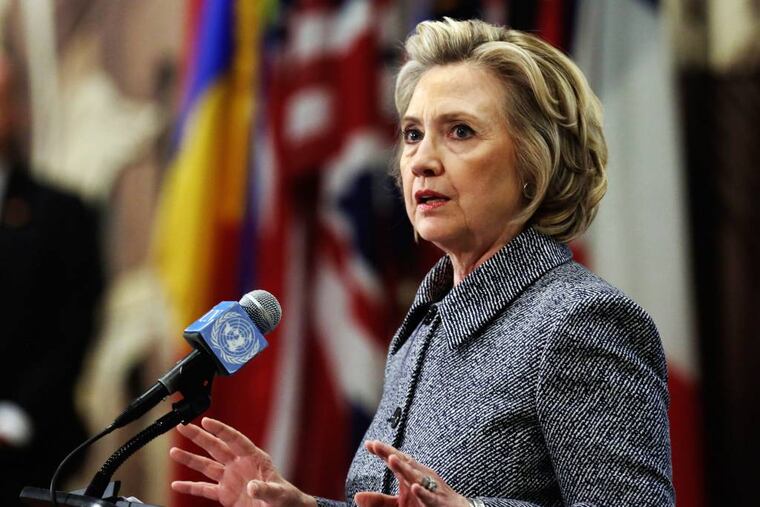Clinton: 'It would have been better' to use government e-mail
WASHINGTON - Under fire, Hillary Rodham Clinton said Tuesday that she regrets using a private e-mail account for business while she was secretary of state but said she did so only as a matter of convenience.

WASHINGTON - Under fire, Hillary Rodham Clinton said Tuesday that she regrets using a private e-mail account for business while she was secretary of state but said she did so only as a matter of convenience.
"I opted for convenience to use my personal e-mail account, which was allowed by the State Department, because I thought it would be easier to carry just one device for my work and for my personal e-mails instead of two," Clinton said in her first public comments about the e-mails.
"Looking back, it would've been better if I'd simply used a second e-mail account and carried a second phone, but at the time, this didn't seem like an issue," she said.
Clinton said she turned over about 30,000 work e-mails, none with classified material, to the State Department after destroying 30,000 private e-mails that were "not in any way related to my work." She said those included correspondence about her daughter's wedding, her mother's funeral, yoga routines, and family vacations.
"No one wants their personal e-mails made public, and I think most people understand that and respect that privacy," she said. "I didn't see any reason to keep them."
Earlier Tuesday, the State Department announced that it planned to release Clinton's work-related e-mails - 55,000 printed pages of them - on a publicly accessible website after a months-long review.
Clinton, who said she saved any e-mail that could possibly be viewed as work-related, said she welcomed the news. "I'm very glad to hear, because I want it all out there," she said.
Clinton made her first extended remarks about the controversy at a hastily scheduled news conference at the United Nations, which followed a speech to commemorate one of the most important moments in Clinton's career.
But the speech on the 20th anniversary of her women's rights speech in Beijing was overshadowed by a pair of controversies - her use of private e-mail to conduct government business and her family foundation's decision to accept foreign donations.
"I am very proud of the work the foundation does," Clinton said in response to the only question about the donations. "I'm very proud of the hundreds of thousands of people who support the work of the foundation and the results that have been achieved for people here at home and around the world."
Some donations to the Bill, Hillary and Chelsea Clinton Foundation have come from nations that degrade women, but Clinton said she had been very clear where she stands on gender equality.
"There can't be any mistake about my passion concerning women's rights here at home and around the world," she said.
The 20-minute news conference came after weeks of silence on both issues, except for a single tweet sent after 11 one night last week.
Republicans had accused Clinton of hiding something, and in recent days, Democrats also had started to call on Clinton to say more.
Republican National Committee chairman Reince Priebus called Clinton's news conference "completely disingenuous."
"If she had an ounce of respect for the American people, she would have apologized for putting our national security at risk for 'convenience,' " he said. "She would've agreed to hand over her secret server to an independent arbiter. And she would've reassured the nation that her influence is not for sale to foreign governments. She did none of that."
Indeed, there was no doubt questions remained. Clinton, for example, said that the "laws and regulations in effect when she was secretary" indicated using personal e-mail was permissible.
White House press secretary Josh Earnest has said several times in the last week that "the administration has given guidance to all of our employees that they should use their official e-mail address when they're conducting official government work."
Clinton said she used a computer server that was set up for former President Bill Clinton's office, which had numerous safeguards and was protected by the Secret Service. "There were no security breaches," she said. She said she would not release the server, as some have demanded.
In December, Clinton turned over 55,000 pages of e-mails to the State Department after her aides reviewed them and selected which pages to hand over.
House Republican leaders say their review of the 2012 terrorist attack that killed four Americans in Benghazi, Libya, forced Clinton to hand over her e-mails.
"Secretary Clinton didn't hand over her e-mails out of the goodness of her heart - she was forced to by smart, determined, and effective oversight by the House Select Committee on Benghazi," said Michael Steel, a spokesman for House Speaker John A. Boehner. "Her news conference raised more questions than it answered, and the American people deserve the truth."
Last month, the Wall Street Journal reported the Clinton foundation began accepting more foreign donations after Clinton left the secretary of state's office, raising questions about potential conflicts of interest. McClatchy reported that more than 40 percent of top donors to the foundation came from foreign sources.
Clinton's news conference - her first formal one in more than two years - was held at the United Nations, an unusual venue for a political event, with limited access to reporters who had received prior credentials for her speech.